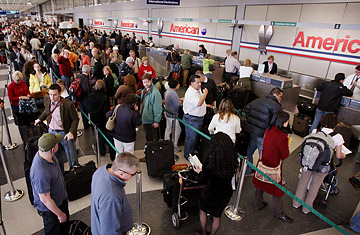
Passengers wait in line for American Airlines at O'Hare Airport.
The Federal Aviation Administration is hoping the safety-related groundings of commercial airplanes that caused havoc for 300,000 passengers around the country last week won't continue into the heavy summer travel season. But the man charged with protecting federal whistle-blowers tells TIME he's got additional cases coming down the runway that could do just that. And the FAA warns that sloppy maintenance work — like that which resulted in the grounding of more than 3,000 American Airlines flights last week — could occur through the end of June as the FAA wraps up a two-phase inspection process.
Scott Bloch, the head of the U.S. Office of Special Counsel — charged with protecting federal whistle-blowers — says he is investigating several new cases involving possibly flawed compliance with airworthiness directives that could lead to more groundings. "There are additional revelations about oversight issues with regard to airline safety that are coming forward," Bloch told TIME on Tuesday. He says his office is probing four or five cases involving two, and possibly three, airlines, but declined to offer any additional details. "Until these new cases develop, I can't speak to whether there would be likely groundings," he says. "I can only say that it is possible."
The FAA has been ratcheting up pressure on airlines since March, when it launched "phase one" of a probe that required its inspectors to make sure each carrier was complying with 10 randomly chosen "airworthiness directives," the agency's written safety bulletins. (About 200 are issued annually.) The FAA followed that with what it calls "phase two," where its inspectors are reviewing 10% of all airworthiness directives per fleet to determine compliance. Initial results show the airlines have been complying with about 99% of the directives. But that remaining 1% was enough to cause hundreds of flight cancellations.
While the FAA is relatively optimistic about the summer travel season, there may be more groundings to come in the next couple of months. "I don't have a crystal ball, but we would make the assumption that the airlines have been looking very closely at their AD compliance" following the crackdown, says FAA spokeswoman Allison Duqette. "But there's no way for me to really predict what is going to happen." The two-phase review didn't start with the most challenging ADs, which means that the chance of more trouble for the airlines remains the same until the audit process concludes June 30. Aviation experts say the older an airline's fleet, like those used by the big legacy carriers such as American, Northwest and United, the more likely its planes are to be grounded.
Both Scott Bloch and Rep. James Oberstar, the Minnesota Democrat who chairs the House Transportation Committee, are highly critical of the way the FAA has been overseeing the nation's airlines. Asked Monday night if the nation's air travelers have endured the worst in the latest round of groundings, Oberstar snapped: "We'll be through the worst of it when they take their customer service initiative directive and tear it up, shred it, and establish a new mind-set that is aviation safety-compliant. What they're doing now is going through the mechanics of what they should have been doing for months."
He also believes the FAA isn't ensuring sufficient maintenance is being done during the current tough economic times. "In the '70s, '80s and early '90s when aviation went through severe economic downturns — that either were, or just short of, recession — the FAA stood vigilant to make sure that the airlines were investing as much in maintenance in the hard times as they did in the good times," Oberstar says. "I don't think there is that attitude of vigilance now within the FAA."
Duquette takes issue with those allegations. She points out that airline travel has become much safer as the FAA and airlines have worked more as partners since the deadly Valujet crash in 1996. "We've had a very concerted effort for probably the past 7 to 10 years using data to identify risk in the system well before accidents happen," Duquette says. "That's what has helped reduce our accident rate over the years — getting information from the industry, from the airlines about where potential problems may crop up."
The trouble with American's MD-80s cropped up during a phase one inspection, Duquette says, and, when rechecked during phase two, was found to persist on 15 airplanes. Fasteners designed to secure wires to keep them from chafing were installed too far apart, and in some cases backwards. That's when the FAA — sensitive about complaints from its own workers that it had been too cozy with Southwest Airlines, which had been allowed to keep its planes flying without required inspections to detect fuselage cracks — insisted American ground its MD-80 fleet until the required work was repaired.
But why ground the entire fleet, instead of letting the airline do it over several weeks, as it requested and as many carriers had been allowed to do with previous enforcement actions? "We would not have approved that," Duquette says. "Given what we found at Southwest Airlines, we feel we needed to step up our focus on AD compliance for a couple months. But that should be ending in June and hopefully there will be no disruption to summer travel plans."
